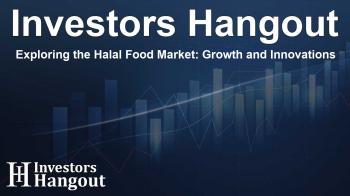Exploring the Halal Food Market: Growth and Innovations

The Halal Food and Beverage Market: Trends and Projections
The halal food and beverage industry is on the verge of a massive transformation, projected to grow from USD 2.52 trillion in 2024 to an astounding USD 5.44 trillion by 2034. This growth, with a remarkable CAGR of 8%, stems from the surging global demand driven primarily by the expanding Muslim population and increasing awareness of halal certification.
The Rise in Global Demand
As the Muslim populace grows, so does the need for halal food and beverages, a trend significantly impacting the market's trajectory. Consumers are increasingly seeking halal products not only due to religious beliefs but also for the assurance of quality and hygiene associated with halal certification. The increased focus on ethical eating in today's society further strengthens this demand.
Understanding Halal Certification
Halal certification plays a crucial role in this market. It ensures that the products comply with Islamic dietary laws, promoting hygiene and ethical sourcing. As awareness grows, more consumers are recognizing the significance of authentic halal products, which contributes positively to market growth.
Factors Contributing to Growth
Several key drivers are propelling the halal food and beverage market. Rising disposable incomes allow individuals to choose specialized products, including halal-certified foods, which enhances market dynamics. The modern Muslim community places high value on consuming ethical products, further facilitating market expansion. Additionally, urbanization contributes to easier access to halal products, making them readily available in supermarkets and online outlets.
Market Analysis by Regions
The halal food and beverage market displays varying trends across regions. The Asia-Pacific area currently dominates the market, with countries such as Indonesia and Malaysia leading the charge in halal product demand. Meanwhile, Europe is rapidly emerging as a significant market. Countries such as France are witnessing substantial growth due to improved distribution networks and consumer awareness about halal food options.
North America: Trends and Developments
In North America, the halal market is burgeoning, supported by a growing number of halal certifying agencies. Such initiatives bolster consumer trust and ensure the availability of quality halal products. Furthermore, the online segment is expected to grow the fastest in this region, leveraging convenience and accessibility for consumers.
Product Segmentation and Innovations
The halal market’s product segmentation features meat and alternatives, which commanded the largest market share in 2024, due to increasing demand for ethical meat alternatives. Furthermore, the grain product segment is anticipated to grow rapidly. Similarly, the rise of halal-certified convenience foods and snacks reflects emerging consumer preferences.
The Role of Technology
Technological advancements greatly influence the halal food and beverage market. Artificial intelligence is playing a pivotal role, enhancing verification processes through image recognition and optimizing supply chains for better product tracking. These innovations ensure compliance with halal standards, bridging the gap between technology and tradition.
Emerging Trends in the Halal Market
Several notable trends are prompting changes in the halal food sector. Increased awareness among younger Muslim populations about the benefits of halal products, coupled with entrepreneurial ventures producing diverse halal offerings, illustrates the evolving landscape. New entrepreneurs are innovating with halal products that range from food items to eco-friendly cosmetics, further catering to the demand for ethical consumption.
Challenges Facing the Market
Despite positive growth trajectories, the halal food and beverage market faces challenges like rising manufacturing costs and ingredient prices. These factors can deter manufacturers, potentially leading to higher prices for consumers. Furthermore, issues surrounding food fraud may cause mistrust among consumers, making it imperative for brands to maintain strong certification practices.
Looking Ahead: Opportunities and Strategies
The halal food and beverage market harbors great potential, especially with increased entrepreneurial activity. Companies focusing on innovative halal solutions, such as plant-based products and healthier alternatives, are well-positioned to thrive. Monitoring market dynamics and consumer behavior will be crucial for businesses aiming to capitalize on this burgeoning market.
Frequently Asked Questions
What is driving the growth of the halal food market?
The growth is primarily fueled by the increasing Muslim population, rising disposable incomes, and growing awareness of halal certification.
Which regions are leading in halal food consumption?
The Asia-Pacific region leads, with notable growth expected in Europe and North America as well.
How does technology influence the halal food industry?
Technology enhances verification processes and supply chain management, helping maintain compliance with halal standards.
What challenges does the halal market currently face?
Challenges include rising production costs, food fraud issues, and the need for consumer trust in halal certifications.
What future opportunities exist for halal food businesses?
Entrepreneurship in the halal sector is rising, with innovative products and a focus on ethical food sourcing creating new market opportunities.
About The Author
Contact Addison Perry privately here. Or send an email with ATTN: Addison Perry as the subject to contact@investorshangout.com.
About Investors Hangout
Investors Hangout is a leading online stock forum for financial discussion and learning, offering a wide range of free tools and resources. It draws in traders of all levels, who exchange market knowledge, investigate trading tactics, and keep an eye on industry developments in real time. Featuring financial articles, stock message boards, quotes, charts, company profiles, and live news updates. Through cooperative learning and a wealth of informational resources, it helps users from novices creating their first portfolios to experts honing their techniques. Join Investors Hangout today: https://investorshangout.com/
The content of this article is based on factual, publicly available information and does not represent legal, financial, or investment advice. Investors Hangout does not offer financial advice, and the author is not a licensed financial advisor. Consult a qualified advisor before making any financial or investment decisions based on this article. This article should not be considered advice to purchase, sell, or hold any securities or other investments. If any of the material provided here is inaccurate, please contact us for corrections.

